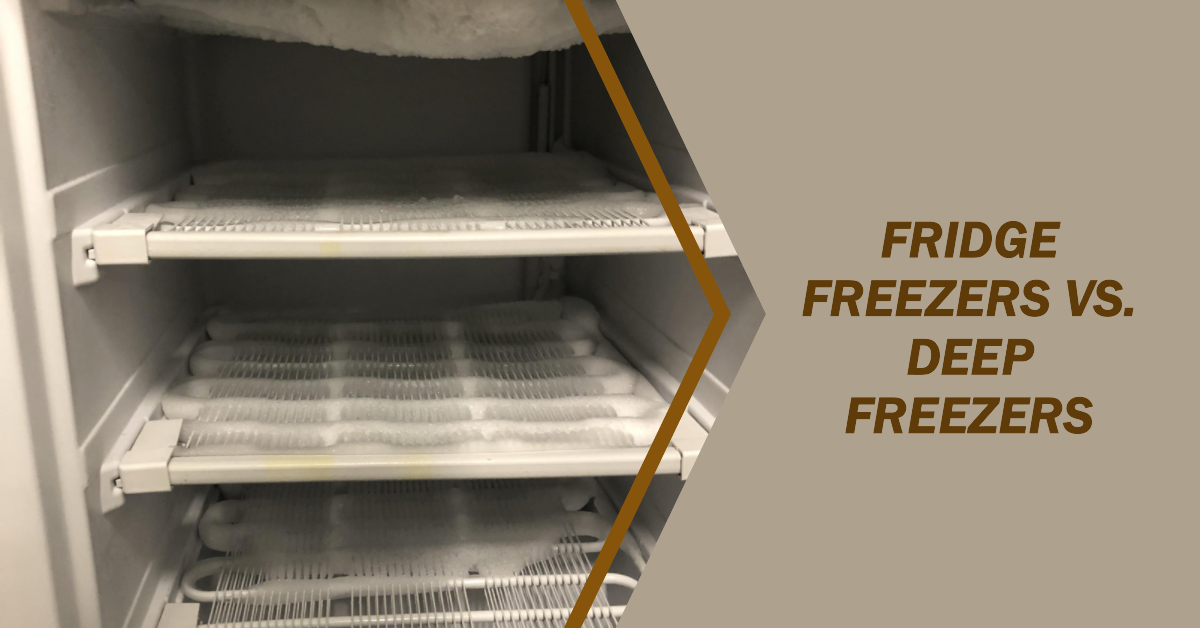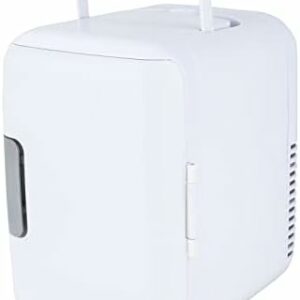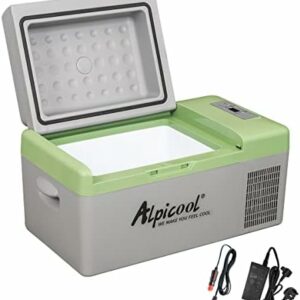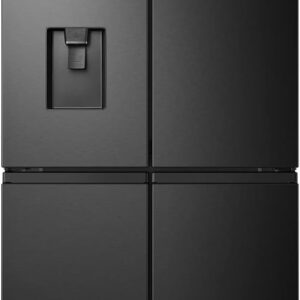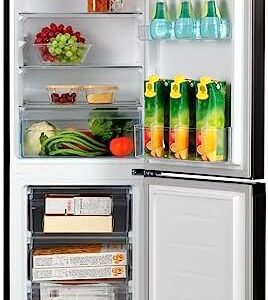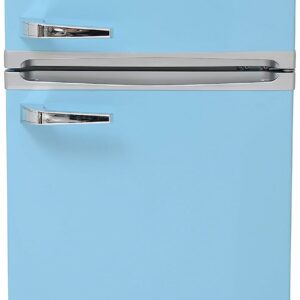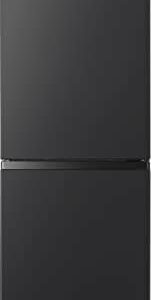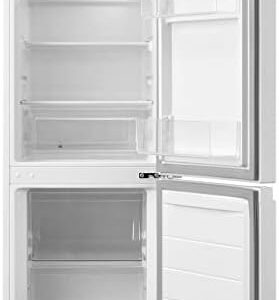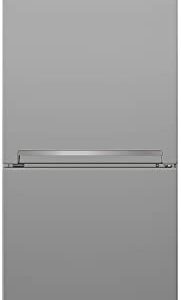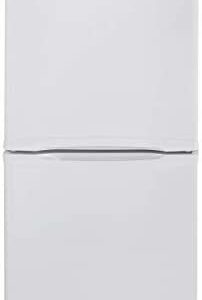Keeping food fresh is essential, and both fridge freezers and deep freezers excel at this task. But choosing the right appliance depends on your specific needs and lifestyle. This comprehensive guide from Wine Fridge Hub dives deep (pun intended!) into fridge freezers and deep freezers, equipping you to make an informed decision.
Understanding Your Needs
Before diving into the specifics of each appliance, consider your food storage requirements. Here are some key questions to ask yourself:
- How much frozen food do I typically store?
- Do I buy groceries in bulk, or do I prefer smaller, more frequent shopping trips?
- Do I freeze a lot of homegrown produce or leftovers?
- How much space do I have in my kitchen?
- What features are important to me (e.g., automatic ice maker, water dispenser)?
Once you have a clearer understanding of your needs, you can start exploring the advantages of each appliance type.
Benefits of Fridge Freezers
- Convenience: Fridge freezers offer the ultimate convenience, combining a refrigerator and freezer compartment in one unit. This allows for easy access to both fresh and frozen food items without having to switch between appliances.
- Space-saving: Fridge freezers are a great option for smaller kitchens as they occupy a single footprint. They come in various sizes, so you can find one that perfectly fits your designated space.
- Ideal for Everyday Needs: For most households with standard grocery shopping habits, the freezer compartment in a fridge freezer provides ample space for storing frozen meals, vegetables, fruits, and ice.
- Variety of Features: Modern fridge freezers come equipped with a range of features to enhance your food storage experience. These may include automatic defrosting, adjustable temperature zones, water dispensers, and ice makers.
Benefits of Deep Freezers
- Large Capacity: Deep freezers boast significantly larger capacities compared to fridge freezers, typically ranging from 100 to over 500 litres. This makes them ideal for bulk buyers, families with large grocery needs, or those who freeze large quantities of food, like homegrown vegetables or meat from seasonal hunts.
- Superior Long-Term Storage: Deep freezers can reach much lower temperatures than fridge freezers, typically reaching -24°C. This colder environment slows down enzyme activity and microbial growth, preserving the quality and nutritional value of food for extended periods.
- Energy Efficiency: Due to their thicker insulation and less frequent opening, deep freezers tend to be more energy-efficient than fridge freezers. Chest freezers, in particular, excel in this area as they lose minimal cold air when opened due to the smaller airspace compared to upright models.
- Cost-Effective for Bulk Buying: Purchasing groceries in bulk can lead to significant savings. Deep freezers allow you to take advantage of bulk-buying opportunities and store food for longer durations, potentially reducing your overall grocery expenses.
Deep Freezers Might Be Right for You If:
- You buy groceries in bulk and need extra storage space.
- You freeze large quantities of homegrown produce or meats.
- You prioritise long-term food storage and quality preservation.
- Energy efficiency is a major concern for you.
- You have ample space to dedicate to a separate appliance.
Fridge Freezers vs. Deep Freezers
Now that you understand the individual strengths of fridge freezers and deep freezers, let's delve into a detailed comparison to help you make an informed choice:
| Feature | Fridge Freezer | Deep Freezer |
|---|---|---|
| Capacity | Typically 4 to 15 cubic feet | 100 to over 500 litres (3.5 to 18 cubic feet) |
| Ideal for | Everyday frozen food storage needs, limited space, easy access to items | Bulk buyers, long-term food storage, large items, preserving food quality |
| Temperature | -15°C to -18°C | Up to -24°C |
| Food Preservation | Suitable for most frozen food storage | Superior for long-term storage and preserving quality |
| Design | Upright with shelves and drawers | Mostly chest freezers (horizontal opening) or upright models (similar to fridge freezers) |
| Accessibility | Easy access to frequently used items | Requires more digging and rearranging in chest freezers; easier access in upright models |
| Defrosting | Mostly frost-free (automatic) | May require manual defrosting periodically |
| Cost | Generally more affordable | Can be more expensive due to larger size and features |
| Space | Requires dedicated space in the kitchen | Requires dedicated floor space |
| Energy Efficiency | Less energy-efficient due to frequent opening | More energy-efficient due to thicker insulation and less frequent opening |
Additional Considerations:
- Noise Level: Upright deep freezers can be noisier than chest freezers. Consider noise levels if the appliance will be placed near a living area.
- Features: Fridge freezers may offer features like automatic ice makers and water dispensers, while deep freezers typically focus on storage capacity and efficiency.
- Shelf Life: Food stored in a deep freezer will generally have a longer shelf life compared to a fridge freezer due to the colder temperatures.
By carefully considering the factors above, you can determine which appliance best aligns with your needs and lifestyle.
Different Types of Fridge Freezers and Buying Considerations
Now that you've grasped the advantages of fridge freezers and compared them to deep freezers, let's explore the different types available and key factors to consider when making your purchase:
Types of Fridge Freezers:
- Top Freezer: This classic design features a freezer compartment positioned above the refrigerator section. It's a space-saving option and offers easy access to frequently used frozen items.
- Bottom Freezer: This layout places the freezer compartment below the refrigerator section. It provides more refrigerator space for everyday items and may offer better ergonomics for those who access the refrigerator more frequently.
- Side-by-Side: This configuration features two separate doors, one for the refrigerator and one for the freezer, positioned side-by-side. It offers a luxurious look and provides ample storage space in both compartments. French Door models within this category may have additional features like drawers and in-door shelves.
Choosing the Right Fridge Freezer:
Here are some key factors to consider when selecting a fridge freezer:
- Size and Capacity: Measure your available space and choose a fridge freezer with appropriate dimensions. Consider your typical grocery needs and how much frozen food storage you require.
- Configuration: Think about which freezer placement (top, bottom, side-by-side) best suits your kitchen layout and how you access food items.
- Features: Decide on the features that are important to you. Automatic defrosting is a common convenience, while features like ice makers and water dispensers can add value but may increase the cost.
- Energy Efficiency: Look for an Energy Rating label to compare the energy consumption of different models. This can impact your running costs over time.
- Budget: Determine your budget and choose a fridge freezer that offers the features and capacity you need within your price range.
- Brand Reputation: Research different brands and consider factors like warranty coverage and customer service reviews.
Fridge Freezers You May like:
-
 Youyijia 4L Mini Car Fridge – White
Youyijia 4L Mini Car Fridge – White -
 Alpicool Y20 20L Car Fridge
Alpicool Y20 20L Car Fridge -
 Hisense RQ560N4WBF Black Fridge Freezer – 454 Litres, Cross Door Design
Hisense RQ560N4WBF Black Fridge Freezer – 454 Litres, Cross Door Design -
 CHiQ FBM157L4EU 157L Freestanding Fridge Freezer
CHiQ FBM157L4EU 157L Freestanding Fridge Freezer -
 Montpellier MAB2035PB 88L Retro Style Undercounter Fridge Freezer (Pastel Blue)
Montpellier MAB2035PB 88L Retro Style Undercounter Fridge Freezer (Pastel Blue) -
 Hisense RB327N4BBE 50/50 Frost Free Fridge Freezer – Black
Hisense RB327N4BBE 50/50 Frost Free Fridge Freezer – Black -
 HADEN HK124W 134 Litre 60/40 Split Low Frost Freestanding White Fridge Freezer
HADEN HK124W 134 Litre 60/40 Split Low Frost Freestanding White Fridge Freezer -
 Beko 213 Litres 50/50 Freestanding Fridge Freezer
Beko 213 Litres 50/50 Freestanding Fridge Freezer -
 CANDY CSC1365WEN Static Freestanding Fridge Freezer – 173L – White
CANDY CSC1365WEN Static Freestanding Fridge Freezer – 173L – White
How to Choose the Perfect Deep Freezer
Deep freezers offer exceptional storage capacity for those who prioritize bulk buying and long-term food preservation. Here's what to consider when choosing a deep freezer:
- Chest Freezer vs. Upright Freezer:
- Chest Freezers: These classic models offer the most space for your money and are generally more energy-efficient due to their superior insulation. However, accessing specific items requires more digging and rearranging. They can also be noisier than upright models.
- Upright Freezers: These provide a more refrigerator-like layout with shelves and drawers, allowing for easier access to frozen goods. However, they tend to be less energy-efficient and may have a slightly smaller capacity compared to chest freezers of similar size.
- Capacity: Deep freezers come in a wide range of capacities. Consider your typical grocery needs and how much food you plan to store at any given time.
- Features: While the primary function is storage, some deep freezers offer features like interior lighting, baskets for organization, or temperature alarms. Decide which features are most valuable to you.
- Defrosting Mechanism: Most modern deep freezers are frost-free, eliminating the need for manual defrosting. However, some chest freezers may still require manual defrosting periodically. Consider the convenience factor and how much time you're willing to dedicate to maintenance.
- Placement: Deep freezers require dedicated floor space. Measure your available space and ensure proper ventilation around the appliance.
By considering the information presented in this guide, you're now well-equipped to make an informed decision between a fridge freezer and a deep freezer. We hope this comprehensive resource has empowered you to choose the appliance that best aligns with your needs and lifestyle.
